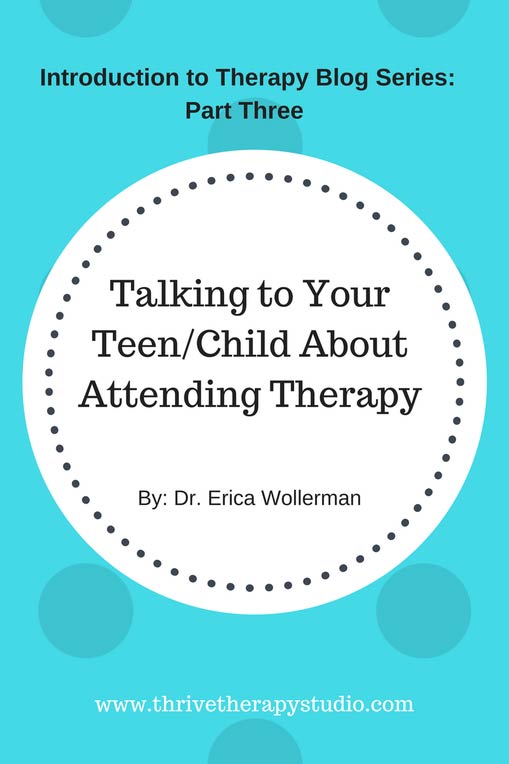Introduction to Therapy Blog Series: Talking to Your Teen/Child About Attending Therapy

Once parents have made the decision to bring their child or teen to therapy, a very common concern they may have is about how they should tell their child or teen that this is happening. Parents rightfully understand that some kids will perceive attending therapy as a weakness, problem, or judgment that something is wrong with them. I have to say that unfortunately, there is still a huge stigma around attending therapy so this concern is a valid one in my eyes.
The good news is that parents have a lot of power in this situation to change the way therapy is viewed, by their child/teen but also other members of the family. Here are a few guidelines to help manage these conversations:
- Talk about therapy as a positive thing. One of the best things parents can do is to talk about, and actually view, therapy as a positive thing. Frame it as an opportunity to get support from an adult who cares. What I usually make sure families and clients know is that therapy in itself is not about something being “wrong” but about understanding ourselves and working on challenges that we all have. Please do not use therapy as a threat of “If you don’t shape up, we will have to take you to therapy,” this only works against you if you do end up bringing your child or teen in as they will most likely be less responsive and feel that it is a punishment to get out of, rather than an opportunity to learn and improve.
- Share your positive experiences in therapy. If you are a parent who attends or has attended therapy, share that with your child or teen. Let them know that they are not alone in needing extra support from time to time. I would caution parents not to share too much about why they attended therapy, but just enough to let their child/teen know they are not alone.
- Try not to overly focus on the reasons why you are bringing your child or teen to therapy. Please don’t tell them that you are bringing them because you think they have this problem or that problem. Tell them you want them to have a supportive adult besides you to talk to. Tell them that the time is theirs to use as they want to and to talk about what they would like. The less parents try to control therapy through their child or teen, the better their child or teen will respond.
- Please don’t tell your child how much therapy is costing. This is a tough one but so important. Most children and teens realize that the services they receive cost money to some extent but the more this is emphasized, the more they feel pressure to “get better” as well as to not need therapy. While we do want our clients to feel better and resolve the issues that brought them to therapy, pressuring that goal does not help, particularly when it is financially motivated.
As a parent, I am confident you will find your own way to talk to your child or teen about attending therapy. Hopefully by using these guidelines, the conversation will go as well as possible!
If you would like to talk with a Thrive Therapist about yourself, your child, or teen attending therapy, please reach out to us by phone at (858) 342-1304.
As always, thanks for reading and comments are always welcome regarding any issues around child or teen psychotherapy services in San Diego by Thrive Therapy Studio.
To stay in the loop on the services offered and to receive updated information about Thrive, please feel free to sign up for the newsletter through the following link: http://eepurl.com/cvGx5n.
Reach out to start
your healing journey

